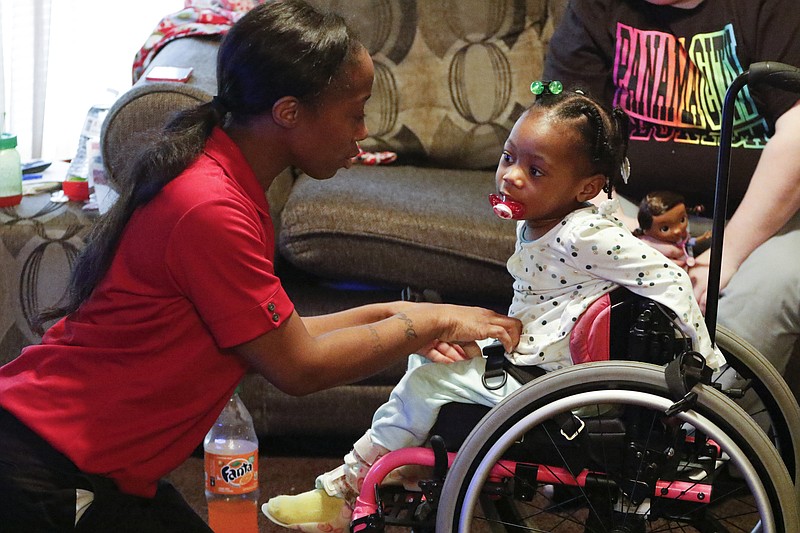View other columns by David Cook
Friday afternoon, in the same church where 11 months ago hundreds, if not a thousand-strong crowd, gathered to eulogize the five soldiers killed on July 16, a young black woman named Bianca Ernestine Horton was laid to rest.
She, too, was a Chattanooga hero.
"She was murdered and killed for truth," said Olivet Baptist pastor Kevin Adams, who compared her death to Christ's. "He was killed for truth 2,000 years ago."
Horton's death feels like an assassination. Last year, she'd been injured in a gun attack that left one dead and her own infant daughter paralyzed. Police caught the alleged shooter, and Horton, only 26, was playing an active role as a witness in the murder case against him.
Eleven days ago, she was found shot to death on the side of the road at the foot of Missionary Ridge. Even though police are still investigating the connection, many believe the shooting was an act of silencing.
"Do as Bianca did," Adams implored the crowd. "Stand up for justice."
Justice. Heroism. Sacrifice. The same words we used - and use - to honor the July 16 soldiers also can apply to Horton, who, knowing the dangers, still risked her life for righteousness' sake.
"Courage," said one police officer who knew her.
Yet at Friday's service, there was no talk of NoogaStrong. No mention of permanent memorials. No famous athletes pledging funds for Horton's four motherless children. No media.
Politicians? Only Mayor Andy Berke and state Senate candidate Nick Wilkinson were there, and spoke, but then left 55 minutes into the 100-minute service.
(If Horton's murder was not connected to her testimony, her life was still heroic. If it was, then City Hall or the district attorney's office should face the music: Why wasn't she protected more? Did she refuse protection? Were authorities aware of threats against her? If so, why not cancel her testimony? Did they risk her life to make a case?)
Perhaps 300 people were there for the service, and maybe five were white. Horton was buried in a pearl-white coffin, covered in a white shroud, with purple and pink flowers across the top.
"It hurts so bad," one woman wailed from the pews.
"My lifeline is dead," said her brother.
Horton's death is the latest in what feels like an ongoing funeral of young black Chattanoogans. For many, the valley of the shadow of death doesn't end.
"I feel similar anger to the way I felt on 9/11. Hopelessness. Helplessness," said Elisabeth Zachary. "Where do you put this grief?"
Zachary has been teaching high school English for 26 years to poor and traumatized students in Hamilton County, mostly at The Howard School, now at Red Bank High.
Every year, students of hers are shot. Others, imprisoned. Some are murdered. Others, the murderers. One was beaten to death with a baseball bat.
"I taught Talitha Bowman, Percy Allen and his father, Orlandas Gay, Keiara Patton, Eric Fluellen, Edward Glenn, Jabari Jennings, Demetrius Roshelle - and those are just the ones who died by guns in the past few years," she said. "Not to mention the ones who were shot and recovered, or the ones who died before 2011, or the ones who were stabbed or beaten to death."
"I no longer remember them all," she said.
She's served as a character witness in murder trials. Given journals at Christmas to students who love to write. Brought books - "The Count of Monte Cristo" and the biggest, thickest Dickens she could find - to students in jail who love to read.
Hers is the experience of working intimately with a group of young people - all of them affected by gun violence - that are cursed by some societal Russian roulette: Who will die this year? Who will get arrested?
How do you educate for the future when, for many, there isn't one?
"I am one teacher out of thousands," she said. "My experiences are not unique."
At Horton's funeral, she sat near the front; around the neck of her black dress, she wore an orange scarf, the color of National Gun Violence Awareness Week. Many pastors, too, wore orange ribbons on their suit lapels.
"Precious in the sight of the Lord is the death of his saints," the preacher declared to the crowd.
Yet how precious are these black lives to the rest of us?
Do we honor the heroism of Horton as quickly we do the heroism of others?
In our city's communities of neglect, the funerals don't end, and classrooms are soaked with trauma, and in the middle of the lesson, students look up from their desks and ask: Why should I study if I won't live to 21?
"We're not acknowledging that these lives matter," said Zachary.
Bianca Horton, a Chattanooga hero, went to her grave trying to change that.
David Cook writes a Sunday column and can be reached at dcook@timesfreepress.com or 423-757-6329.

